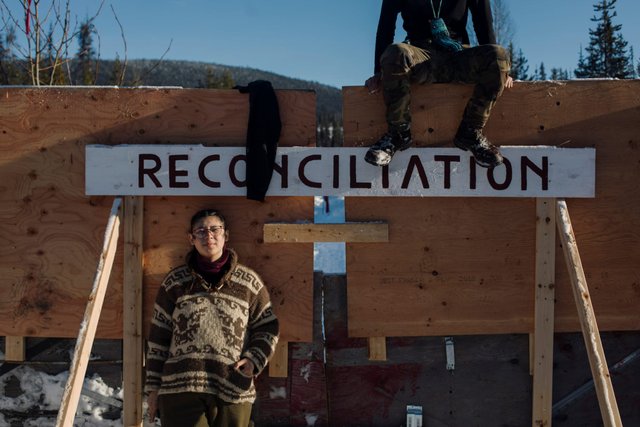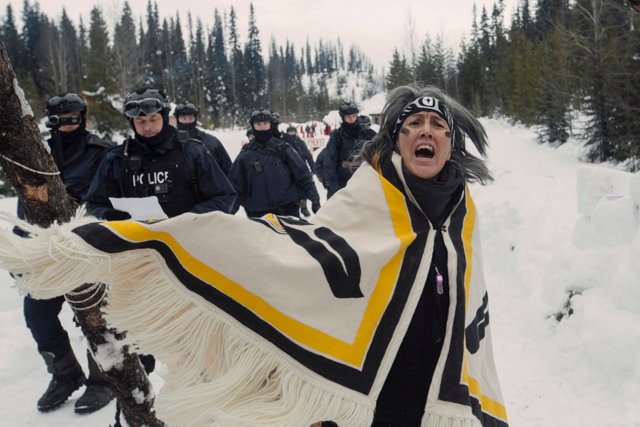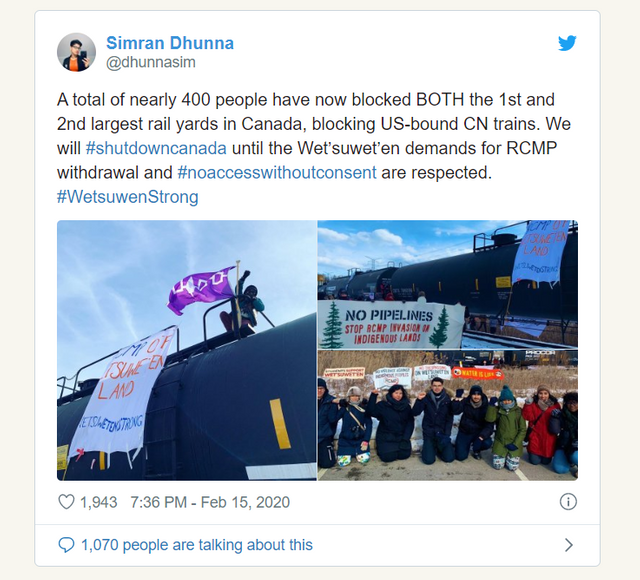A new form of social struggle shuts down Canada


The Wet’suwet’en are the original inhabitants of an area of 22,000 km² in western Canada, in the province of British Columbia. Unlike many other tribes, the Wet’suwet’en have never transferred their territory to the Canadian state, which means they actually have legal autonomy. However, oil and gas companies have been trying for years to develop gas and oil pipeline routes on their territory. This is to transport oil sand, shale gas and natural gas from the Canadian interior to the Western ports.
The Wet’suwet’en have repeatedly vetoed such plans. Nevertheless, energy company TransCanada managed to get permission from the Canadian government for the construction of their shale gas pipeline, the Coastal Gaslink pipeline. However, the decision is greatly disputed because the project should have been subject to a federal environmental review.
I believe that when the government doesn’t follow the law it is incumbent upon citizens to hold their feet to the fire. - Mike Sawyer, environmental consultant
Gas is not green
At local level, a (gas) pipeline poses risk to health and the environment. Its construction causes local deforestation and once the pipeline is there, it can leak and threaten water resources and biodiversity. Given the importance of salmon fishing for the Wet’suwet’en, this issue is particularly delicate.
In addition, gas is also a fossil fuel that contributes greatly to climate change. Both natural gas and shale gas consist largely of methane - a greenhouse gas 86 times stronger than CO2. With all gas extraction and transport, methane leaks into the atmosphere, but shale gas is extra notorious for that. Because of new gas infrastructure, gas is now also the biggest contributor to the growth in emissions.
Like many indigenous peoples, the Wet’suwet’en appear to live on a front line in a battle between fossil companies on the one hand, and environmentalists on the other. In addition to the effects of climate change, that are slowly becoming clear, colonization displaces the Wet’suwet’en outside their territories' borders in a quite direct way. Moreover, (fossil) infrastructure projects often entail a rise in violence towards women. The Wet’suwet’en describe how in recent years indigenous women went missing in the vicinity of so-called 'man camps'. The road that runs alongside these labor camps is therefore called 'highway of tears'. Fighting for the environment, women's rights and decolonization all come together at the anti-pipeline front.

Healing program
Due to the threat of various pipeline projects, the Unistot’en, a sub-clan of the Wet’suwet’en, started reclaiming their country. Led by Frida Huson, they went to live deep in the woods in self-built huts at the precise spot where the TransCanadian pipeline was planned. Moreover, they built a centre and developed a healing program, centred on the healing properties of the land.
The Unist’ot’en Healing Centre was constructed to fulfill their vision of a culturally-safe healing program, centred on the healing properties of the land. It is the embodiment of self-determined wellness and decolonization, with potential to build up culture-based resiliency of Indigenous people who need support, through re-establishing relationships with land, ancestors and the underlying universal teachings that connect distinct Indigenous communities across the world. - source
By living there they embody their resistance and the alternative they are fighting for: a way of dealing with the environment that is much more sustainable than the pipeline. This model was copied by neighboring clans, creating multiple strategic blockades.
Reconciliation is dead, revolution is alive
The enforcement of the injunction started with special intervention units that were dropped by helicopter past the blockades. Heavily armed agents on the other side began to break through a barricade simultaneously. 'Reconciliation' was written on the inside of that barricade, referring to Prime Minister Trudeau's promise to come to terms with the Canadian colonial past. How much that promise was worth became clear during the enforcement of the interlocatory injunction approved by Justice Church, who also approved the TMX pipeline on February 4, 2020. An evacuation that goes against international, native and Canadian law. At the same time, the Wet’suwet’en lit a ceremonial fire in which they threw a Canadian flag with the inscription - 'the reconciliation is dead, the revolution is alive'.
That prophetic slogan became true the following days. Under the name #shutdowncanada, solidarity actions support the fight of the indigenous Wet’suwet’en. Canadian National Railway network has been paralyzed for more than a week by blockades by the Mohawks tribe. Shunting grounds and countless other points were blocked or sabotaged for a few hours, actions that also resonate in the US. At a certain point, numerous blockades of critical transportation infrastructure had paralyzed both freight and commuter lines throughout Canada. A rail gridlock of this magnitude represents an emergency for the Canadian economy, damage estimates are in the high millions. Just like pipelines, railway lines are crucial ecological links, each with their historical role in exploiting and colonizing the Canadian interior.
With these actions, the solidarity movement makes clear how vulnerable the network society is and how effective it is to disrupt traffic flows. Just like the Piqueteros in Argentina and more recently the yellow vests movement in France and demonstrators in Chile or Hong Kong, they represent a new, more flexible form of social struggle. The recent events make one thing clear: This battle's not over yet.

Want to know more?
http://unistoten.camp/media/invasion/

A powerful and important post, @keysa - forgive me for being slow to curate as we find our community feet. To be the voice for indigenous people in the grab for land and resources is needed. Thank you for being one of those voices.
Shared this post to the @c-squared curation community for some extra upvote and community support.
Shared also to my personal twitterfeed: #POSH https://twitter.com/BreugelMarike/status/1234099758941126657?s=20
Thanks for posting from our Ecotrain community page!!
Keep up the great posts, blogging, photographs, vlogging & inspiration.
With Love From ecoTrain
This post was shared in the Curation Collective Discord community for curators, and upvoted and resteemed by the @c-squared community account after manual review.
@c-squared runs a community witness. Please consider using one of your witness votes on us here
Hello!
This post has been manually curated, resteemed
and gifted with some virtually delicious cake
from the @helpiecake curation team!
Much love to you from all of us at @helpie!
Keep up the great work!
Manually curated by @georgeboya.
@helpie is a Community Witness.